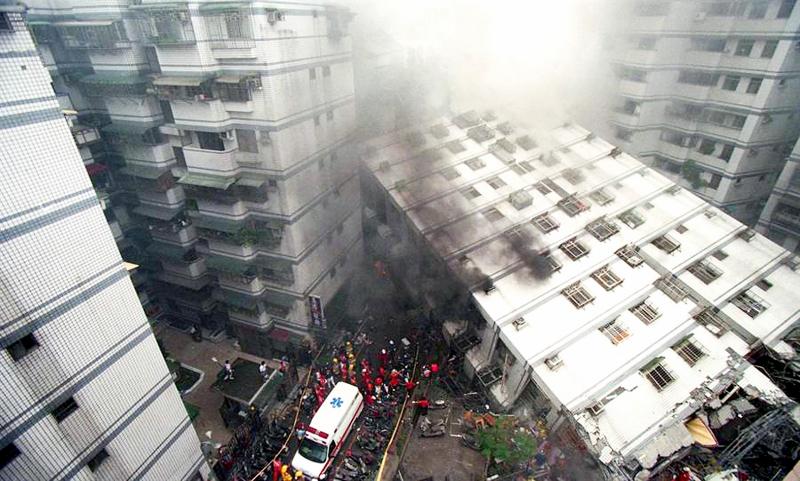The Central Weather Bureau yesterday received about 50,000 views on Facebook after it posted the data that it collected on Sept. 21, 1999, when the nation was devastated by a magnitude 7.3 earthquake.
The data showed that the 921 Earthquake hit the nation at 1:47am, with the epicenter being 7km southwest of the bureau’s quake detection center in Nantou County’s Yuchi Township (魚池) at a depth of 8km.
The quake left 2,456 people dead and 10,718 injured, while 53,661 houses were fully destroyed and 53,024 houses damaged, with the cost of the damage estimated at NT$300 billion (US$10.8 billion at the current exchange rate.)

Photo courtesy of the New Taipei City Public Works Department
Even after 22 years, the quake remains a horrifying memory for many Taiwanese, the bureau said.
The quake was later identified to have been triggered by the movement of the Chelungpu Fault (車籠埔斷層), leaving a 105km-long surface rupture in central Taiwan, the bureau said.
The massive earthquake prompted the government to upgrade the national disaster relief system related regulations, the bureau said, adding that it also inspired the bureau to continue to improve its earthquake early warning system.
“We started developing the earthquake early warning system in the 1990s. By 1999, the system was able to locate an epicenter about 102 seconds after a quake occurred,” the bureau said. “After the 921 Earthquake, we further upgraded the system by installing more quake detectors across the nation and off the coast, and applying cutting-edge computing technology. By 2016, Taiwan became the third country in the world able to issue early earthquake warnings, following Mexico and Japan.”
The system can now disseminate an alert within 10 seconds of a quake being detected, the bureau said.
The bureau’s post drew 50,000 views in the first eight hours, with nearly 200 people recalling their experiences of the night.
“I was in Taipei when the earthquake happened. First I heard the rumbling sound that people usually hear before an earthquake, which was similar to noises produced on construction sites. Then my apartment started shaking vertically and stopped shaking all of a sudden. We thought it was over, until we experienced much more severe shaking. Next thing I knew there was a major power outage, and we did not know about disasters in other parts of the country until the next day,” Amy Hsieh wrote.
Johnson Cho said that he was working a midnight shift at a convenience store when the earthquake struck.
“Two-thirds of the alcohol on the high shelves fell to the ground, and we spent all night cleaning the debris scattered all over the place,” Cho wrote. “As the convenience store was the only place in the neighborhood that had electricity, people who needed to go to work the next day came into the store to buy steamed buns for breakfast. That was the most steamed buns I sold in a day.”
A woman surnamed Wang (王) said that she was living in Taichung’s Taiping District.
“Our house did not collapse, but there was a big crack in the wall. We then spent nearly 10 days sleeping in a tent in an elementary-school playground,” she wrote. “When we eventually returned home, all of us moved our mattresses and pillows down to the ground floor, in case there were strong aftershocks and we needed to run out of the door immediately.”

An essay competition jointly organized by a local writing society and a publisher affiliated with the Chinese Communist Party (CCP) might have contravened the Act Governing Relations Between the People of the Taiwan Area and the Mainland Area (臺灣地區與大陸地區人民關係條例), the Mainland Affairs Council (MAC) said on Thursday. “In this case, the partner organization is clearly an agency under the CCP’s Fujian Provincial Committee,” MAC Deputy Minister and spokesperson Liang Wen-chieh (梁文傑) said at a news briefing in Taipei. “It also involves bringing Taiwanese students to China with all-expenses-paid arrangements to attend award ceremonies and camps,” Liang said. Those two “characteristics” are typically sufficient

A magnitude 5.9 earthquake that struck about 33km off the coast of Hualien City was the "main shock" in a series of quakes in the area, with aftershocks expected over the next three days, the Central Weather Administration (CWA) said yesterday. Prior to the magnitude 5.9 quake shaking most of Taiwan at 6:53pm yesterday, six other earthquakes stronger than a magnitude of 4, starting with a magnitude 5.5 quake at 6:09pm, occurred in the area. CWA Seismological Center Director Wu Chien-fu (吳健富) confirmed that the quakes were all part of the same series and that the magnitude 5.5 temblor was

The brilliant blue waters, thick foliage and bucolic atmosphere on this seemingly idyllic archipelago deep in the Pacific Ocean belie the key role it now plays in a titanic geopolitical struggle. Palau is again on the front line as China, and the US and its allies prepare their forces in an intensifying contest for control over the Asia-Pacific region. The democratic nation of just 17,000 people hosts US-controlled airstrips and soon-to-be-completed radar installations that the US military describes as “critical” to monitoring vast swathes of water and airspace. It is also a key piece of the second island chain, a string of

The Central Weather Administration has issued a heat alert for southeastern Taiwan, warning of temperatures as high as 36°C today, while alerting some coastal areas of strong winds later in the day. Kaohsiung’s Neimen District (內門) and Pingtung County’s Neipu Township (內埔) are under an orange heat alert, which warns of temperatures as high as 36°C for three consecutive days, the CWA said, citing southwest winds. The heat would also extend to Tainan’s Nansi (楠西) and Yujing (玉井) districts, as well as Pingtung’s Gaoshu (高樹), Yanpu (鹽埔) and Majia (瑪家) townships, it said, forecasting highs of up to 36°C in those areas